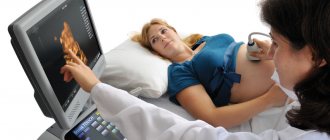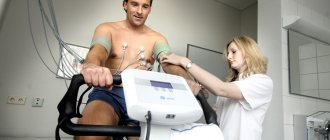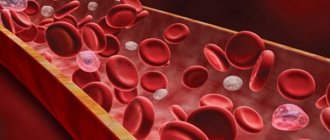A healthy person does not feel the work of his heart in any way. And if heart rhythm disturbances occur, he may feel palpitations, interruptions or “loss of pulse.” The normal heart rate of an adult is from 60 to 90 beats per minute.
Tachycardia is an increase in heart rate to values exceeding 90 beats per minute. Often in such situations, patients complain of increased beating, “fluttering” or “jumping out” of the heart, they say that “the heart is pounding.” Of course, such a condition is a deviation from the norm.
Causes of tachycardia:
Heart diseases
Diseases of the heart and blood vessels that can provoke tachycardia include:
- heart failure;
- coronary heart disease, myocardial infarction;
- aortic insufficiency;
- abnormalities of the cardiac conduction pathways;
- heart rhythm disturbances;
- arterial hypertension.
Other (non-cardiac) causes of tachycardia
:
- respiratory failure, emphysema;
- obesity;
- binge eating;
- alcohol abuse;
- excessive consumption of strong coffee, tea;
- use of narcotic and psychotropic drugs;
- diabetes;
- increased thyroid function;
- pheochromocytoma;
- vegetative-vascular dystonia;
- panic attacks.
Associated symptoms
Tachycardia may be accompanied by:
- nausea;
- cold sweat;
- dizziness;
- shortness of breath;
- pain in the chest, a feeling of squeezing;
- weakness;
- loss of consciousness;
- frequent yawning;
- anxiety, etc.
Tachycardia in heart disease
described in the sections on heart failure, myocardial infarction, aortic insufficiency, cardiac rhythm and conduction disorders, and arterial hypertension.
Other causes of tachycardia are briefly listed below.
Tachycardia and diabetes mellitus
Tachycardia is one of the manifestations of decompensation of diabetes mellitus. Disturbances in the nervous regulation of the heart often lead to increased heart rate, which is difficult to treat.
Tachycardia in diseases of the stomach
In some cases, tachycardia after eating is caused by the so-called gastrocardial syndrome. It is characterized by the fact that spicy or fatty foods lead to exacerbation of stomach pathologies, manifested by pain in the abdominal cavity, combined with an increase in heart rate.
But in itself, an increase in heart rate after eating is not a heart disease, but a symptom that should alert the patient and force him to seek advice from a cardiologist and gastroenterologist.
Tachycardia, sweating and weakness - a triad characteristic of the so-called. dumping syndrome, a condition that occurs after gastric resection surgery. In this case, food from the reduced stomach quickly enters the small intestine and causes the above sensations.
Tachycardia after eating
In overweight people, fat deposits appear not only in the subcutaneous layer, but also on the membranes of internal organs, over time increasingly limiting their natural mobility. In such situations, after a heavy meal, a full stomach puts pressure on the diaphragm, which provokes increased breathing and, as a result, an increase in heart rate.
We must not forget that the processes of digestion and assimilation of eaten food are a serious burden for the body, which requires increased energy consumption. To do this, the heart is forced to increase its contraction rate to ensure sufficient blood flow to the stomach, intestines and digestive glands. And if you are overweight, this task is complicated by large amounts of adipose tissue.
Tachycardia in pathology of the nervous system
An increase in heart rate is also typical for people with psycho-emotional disorders, which can serve as one of the manifestations of a neurotic state. In this situation, the patient just needs to calm down - and then the heart rate will quickly return to normal.
Tachycardia in diseases of the thyroid gland
Increased activity of the thyroid gland (thyrotoxicosis) leads to sustained tachycardia. This occurs with inflammatory diseases of this endocrine organ, as well as the appearance of hormonally active formations (nodes).
Tachycardia during pregnancy
girls, I have a big story. Listen here.
At age 7 I was diagnosed with WPW Syndrome. All my adult life, there was liberation from physical training. Time passed, the body grew. I grew up to 21 years old, my illness made itself felt (there were attacks before, but literally a couple of minutes and they passed). I work as a nurse, at that moment we had a schedule - every other day. I passed my shift and I felt my heart beating very fast. We are on the 6th floor. After thinking about it, I decided to go to therapy. My head was a little dizzy, my heart was racing. I went on foot to the 4th floor to therapy. There was no doctor on site. I went to the reception center on foot (I was afraid to get into the elevator in case I fainted). I went up to the nurse, told her the problem, and she told me, take valerian. I felt funny, I said, where is the doctor? Look there, I heard in response. I went to the doctor. She told me everything. He started listening to me. I saw his face changed, his eyes became big. Scream, urgent gurney and ECG. They took an ECG and called a resuscitator. A huge guy came and tried to relieve my arrhythmia using various techniques, but it didn’t work. Verdict. Go to intensive care. For me it was just a nightmare, since I’m a doctor and I represent everything.
They put me in a room while I was alone. I connected it to the machine, I looked at my heartbeat, and there the frequency was 350-380. I didn't wet myself and I'm not lying. My eyes popped out of my head. It all started at 8.45. morning. They started dripping, Sibazon - they put it on so that I could sleep, but for some reason he didn’t take me. Maybe she was afraid to fall asleep. One wonderful, and for some, terrible moment, a guy was brought in after an accident. I just looked at him and my rhythm immediately returned to normal. She lay down for a little while. Okay, my husband came and brought me things. I wrote a receipt and left. I am confident in my health.
When the cardiogram was deciphered, the following was written: WPW syndrome, paroxysmal tachycardia, atrial fibrillation, with ventricular fibrillation. Then I went to a special center in another city. The doctor looked at me and said, Are you still alive? With such an ECG, in his opinion, a person is not a jerk. I told him that I went down to the first floor myself.
With such an attack, I was naturally not allowed to get pregnant. I completely agreed with the doctors. They offered surgery, at first she refused, but she wanted children and agreed. They performed radiofrequency ablation. Without anesthesia, through blood vessels. It doesn't hurt. This problem was removed, but A, B tachycardia appeared a month later, it was hammering every day. I was only on pills. I had to do it again. The first time it didn’t turn out right or wrong. There were 4 of them in total. Strangely enough, I endured everything. When the last one was done, the doctor said you can get pregnant now.
I am a reasonable person, I allowed my body to survive stress for 6 months. And at one fine moment, life began in my tummy. Now I’m 25 and I’m happy that I plucked up the courage and had the operation.
At the moment, I am suffering from shortness of breath and a rapid heart rate of 90 - 100. The doctor said that this is due to pregnancy and is nothing to worry about. He said that I would give birth myself. And I’m very happy about it. The birth will take place in a specialized maternity hospital.
Treatment of tachycardia
In the case when tachycardia occurs once and quickly stops on its own, this should not be a cause for concern. But if this symptom appears constantly, then you need to consult a cardiologist. It should be remembered that tachycardia can be a symptom of both a functional disorder of the nervous system and a serious heart disease.
Depending on the indications, cardiologists at the CELT clinic conduct examinations to identify the cause of the patient’s tachycardia:
- ECG;
- Holter ECG monitoring;
- Stress test;
- Transesophageal ECG and atrial stimulation;
- EchoCG;
- Study of sugar metabolism disorders;
- Tests for the activity of thyroid hormones.
Having determined the cause of the increased heart rate, the doctor will be able to choose the optimal treatment regimen for the underlying disease.
Make an appointment through the application or by calling +7 +7 We work every day:
- Monday—Friday: 8.00—20.00
- Saturday: 8.00–18.00
- Sunday is a day off
The nearest metro and MCC stations to the clinic:
- Highway of Enthusiasts or Perovo
- Partisan
- Enthusiast Highway
Driving directions
First signs of pregnancy
17.07.2020
Most often, girls confuse the signs of pregnancy with the imminent onset of their period. After all, they are often very similar to each other. But you should be more careful, since pregnancy at the initial stage may not always proceed well without pathologies.
What signs can be noticed in the very first weeks of pregnancy:
- mild pain in the abdomen and light bleeding;
- breast tenderness or tenderness ;
- frequent mood swings.
These signs may appear from the first week of pregnancy . As you can see, many people experience the same symptoms before their period begins.
During pregnancy in the first weeks, pain in the lower abdomen is explained by the fact that fertilization of the egg occurs and its further attachment to the endometrium of the uterus .
Frequent mood swings are also associated with increased hormonal levels during pregnancy , which significantly affects emotionality.
The first four weeks of pregnancy do not show obvious signs. The expectant mother often may not even notice any changes.
From the fourth week, more striking signs of pregnancy appear:
- delay of menstruation;
- breast swelling , darkening of the areolas;
- nausea;
- drowsiness, severe fatigue;
- frequent urination ;
- dizziness;
- temperature change.
Delay
And then the most important sign appears - a delay in menstruation. Most girls notice this, since with a regular cycle, delays are not natural.
Normal delay may be 1-2 days. A delay of 5 or more days is considered an alarm bell. But even with such a delay, a regular pregnancy may not show a possible pregnancy , since the period is too short. Therefore, you can go to the antenatal clinic and donate blood for hCG levels.
Nausea
Nausea is not always a clear sign of pregnancy . stomach problems . During pregnancy nausea most often appears in the morning, but can also persist throughout the day. When visiting a gynecologist , this fact should be noted, since too frequent nausea and vomiting can negatively affect pregnancy .
Frequent urination
Many may think that the cause of this was a common cold. But this feature is also a sign of possible pregnancy . During fertilization, the uterus begins to enlarge, thereby irritating the bladder , so there is a frequent desire to go to the toilet.
Dizziness
Dizziness occurs due to low blood pressure. With sudden movements or changes in body position, you may feel dizziness , darkening of the eyes , spots, and blurred vision.
There is no need to panic if your blood pressure is low, but if you experience frequent increases in blood pressure, you should definitely notify your doctor .
Summarize. If any signs appear, you should immediately take a test or get tested for hCG. Since in the early stages pathologies in the development of pregnancy , so do not delay. It would be best to do a pelvic ultrasound to confirm or refute pregnancy . And in case of pregnancy , eliminate the risk of ectopic pregnancy .
Published in Pregnancy and pregnancy management Premium Clinic
sinus tachycardia during pregnancy
I allocated 2 days for this and signed up in advance. Yesterday I had an ecg and an endocrinologist. They wrote - sinus tachycardia. I persuaded the endocrinologist to put a stamp just like that.
Today I saw an ophthalmologist, - she still couldn’t determine whether I have ICP or not, in general, everything she said was with inserts “probably”, “maybe”, “and before, what did they write?”
Next on the list is a dentist who prescribed me Paradontax and said that she wouldn’t do anything during pregnancy because... does not burn. But I am threatened with gingivitis during pregnancy. I read that periodontax will only relieve the symptoms, but first you need to go to a periodontist and have your teeth cleaned. If I have time and money, I’ll run away. There is no tartar, there is plaque. But it’s impossible to do anything in the mouth—it bleeds right away.
Well, in the end, the whole picture was spoiled by a smelly therapist. I don’t understand how a man can go to work in a state clinic and see grannies from morning to evening. I can understand narrow specialists - but these are - wow, not a man. A young and meticulous dumbass, with the imprint of the village on his face...
For 30 minutes of my time from the moment of recording, he chatted with the women from the next office, conversations throughout the entire corridor, conversation about nothing!!! Then he returned, I went in, there was another nurse sitting in this tiny room, no more than 40 years old. And they’re like, let’s interrogate me about who lives where (about my whole family!!!). About the old registration address - they’re meticulous about everyone. And ask the same thing 5 times (REALLY 5 times!!!!) Why on earth should I even report data to them? Everyone who lives there does not go to this clinic at all!
As a result, he told me that first let my husband take a fluorography, and then he will give an extract and put a stamp!!! Yeah, wait a minute, I don’t understand, where do we live anyway? As far as I remember, fluorography in our country, like vaccinations, is a voluntary matter for everyone. Personally, I only need it for the partner birth option, otherwise I wouldn’t even bother. He gave directions. I had 2 days in which I could leave the child, I’m not going to waste any more of my time. The recording is not a recording, it’s just bullshit - you sit in line and smell nasty coughs and listen to smacks and sniffles...
I ask: “What extract won’t you give me? Actually, I don’t have any statement, I’ve never been served by you.” And he told me: “Well, that means I won’t put a stamp!”
Well... with her. I passed the specialists.
I’ll have to ask about the pediatrician at the appointment, maybe I don’t want to be pushed around like the last time after I was discharged. All these walks, and even in the summer, I have to watch over them...
Yes, I remember, I was discharged from the maternity hospital on Friday, the doctor came on Saturday... ENT!!! I know that she is an ENT specialist, but it turns out that maybe there are not enough staff, she works as a nurse on duty and comes on Saturdays. The doorbell rings in the morning, the baby is sleeping, I’m sleeping - the first night at home after giving birth! She flies in while she is fussing in the corridor, I jump up, and then blood starts pouring out of me onto the floor... Ew, I’m ashamed, I’m at a loss, my husband is running for a rag, the pastel is not tucked in, I’m in shorts and a shirt. She comes in, looks at her son, well, what can you find there - yesterday at discharge we were plump and healthy... But no, I see, she says, there’s a tiny blister somewhere in the mouth (I looked a lot later and couldn’t find it), he prescribes it right away geneferon... The child is screaming because he was woken up. Naturally, I didn’t go for any geneferon...
And so I think, maybe we don’t have to attach ourselves, we won’t go there anyway. A pediatrician at a paid office can now write to me. I don’t want to drag myself to the nursery yet.
That's it, I exhaled. Now I'm calm and happy.










